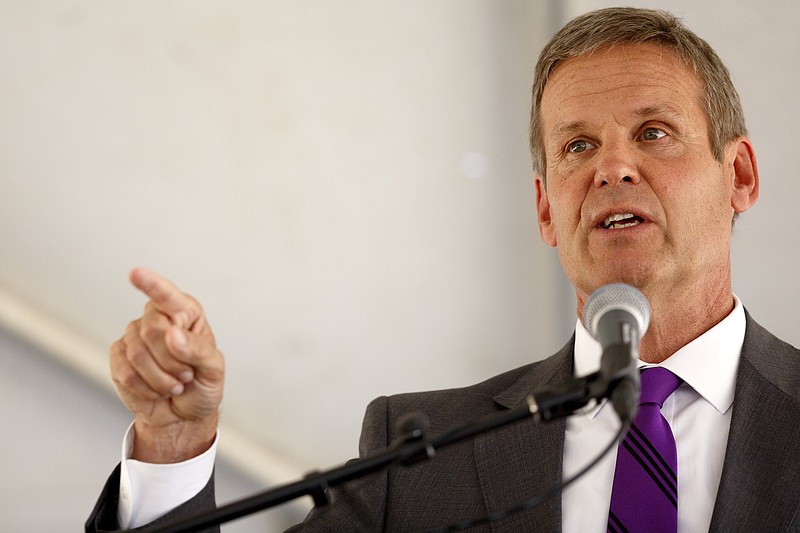NASHVILLE - Tennessee Gov. Bill Lee says he expects a controversial $4 million grant provision included in this year's $38.55 billion budget to get back on track once more transparency and guidelines are established on how groups are awarded taxpayer dollars.
"Oh yeah, we anticipate that money being spent on rural development grants and opportunities to improve communities," the Republican governor said Monday when asked about the disputed $4 million appropriation during a break in his first day of public budget hearings on the fiscal year 2021 spending plan he will submit to legislators next year.
Lee said he and other administration officials "just want to make sure that the lack of clarity that has been evident - or at least has been communicated by some lawmakers - that we bring total clarity to that so there's no misunderstanding about how that money will be spent and to make sure it will be spent effectively."
Democratic leaders have denounced the money as a "slush fund" that then-Republican House Speaker Glen Casada had engineered before his forced resignation over unrelated matters.
The origin of the $4 million grant came from the Lee administration, which last spring had proposed a $3 million amendment for the Department of Economic and Community Development.
But the amount grew by another $1 million at the last minute, later causing surprise from some Republican and Democratic lawmakers after it became public. That occurred when Casada ally Rep. Matthew Hill, R-Jonesborough, publicly announced a local nonprofit group was getting a $75,000 grant to help the organization's mission of easing transitions for children removed from their homes by the state before they are placed in foster care.
Questions have been raised as to whether the $1 million was linked to Lee and Casada's ultimately successful effort to pass a controversial school voucher bill. None of grant funds have been awarded.
"I had no concern at all that this money would be spent any other way than on investments that would create economic opportunities and to serve constituents all across the state," Lee told reporters Monday. "That's how those grants are distributed, that's how they're vetted, that's how it's determined the money is spent and done so in a way that's transparent. That's what we're going to make sure happens."
Casada, who was forced to resign after multiple controversies that began when sexually explicit text messages between himself and a top aide were leaked, has defended the money, saying they were for the sole purpose of making rural and community grants. The money would go for capital projects, repairs, maintenance and operations of local governments as well as nonprofit public safety, library, community and recreational services organizations, he said.
"The process for communities to obtain this funding is completely open and transparent and the funds are designed to enhance our local communities and to be used for the benefit of all citizens," Casada said last week in a statement.
But after Hill's post-legislative session announcement about the grant, Republican Senate Speaker Randy McNally's office issued a statement saying the Oak Ridge lawmaker opposes use of taxpayer dollars for "pork projects." And Casada's successor as House speaker, Republican Cameron Sexton of Crossville, called the lack of information about the grants "troubling."
Economic and Community Development Commissioner Bobby Rolfe told reporters that $4 million is still sitting in the current budget. "The governor's asked us to just basically have it sit there. Over time we'll seek their direction on bringing that program back and hopefully then scoring those requests and awarding those dollars in those rural communities."
During his earlier budget presentation to Lee, Rolfe asked for $90 million in one-time money in next year's budget for the state's FastTrack program, which provides infrastructure, training and economic development grants to local governments and businesses to spur job creation. That comes on top of its $25 million recurring base funding. Given past experience, the money should help generate 20,000 jobs, Rolfe said.
Rolfe also is seeking $25 million - a $5 million increase - in the state's efforts to deploy internet broadband in unserved rural communities, a top priority for Lee. That should help 33,000 people, Rolfe said.
Helping Tennessee's rural counties and communities was a top campaign promise in Lee's 2018 gubernatorial campaign. Rolfe is also proposing $20.58 million for "rural economic opportunity" programs including $12.5 million for site development grants and a $2 million emergency water, wastewater and sewer infrastructure assistance.
Budget hearings continue through Friday.
Contact Andy Sher at asher@timesfreepress.com or 615-255-0550. Follow on Twitter @AndySher1.
